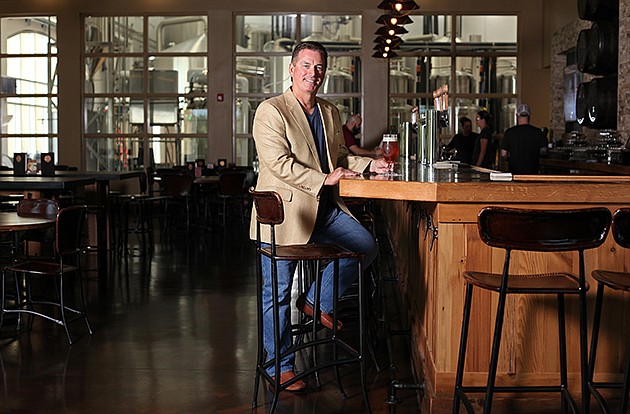- July 26, 2024
-
-
Loading

Loading

Tim Schoen used to be a mega-beer-maker executive.
But when he realized the stumbling blocks for labels just getting started in the industry, issues he knew well such as marketing, distribution and production, he saw an opportunity. Not to prevent craft beer brewers from gaining traction, but to help the upstarts.
That led to the formation of Brew Hub, which is backed by a $100 million investment from the private equity firm The Yucaipa Cos. The past year, says Schoen, was successful and educational. It “was above and beyond what was expected,” he adds.
The first of five planned Brew Hub facilities nationwide opened last year in Lakeland, a 63,000-square-foot building along Interstate 4. It stands out because its design includes a two-story bottle and giant bottle caps displaying logos of partner brewers. Brew Hub makes money by brewing beer for its client-partners; non-brewing management and other services; and sales of its three house-made beer brands.
At Lakeland, the model has worked so well that the facility is about to add three new partner brewers. That will expand production capability 60%, from 60,000 to 100,000 barrels a month. The new beers will join six other partner brewers, a list that includes Tampa's Cigar City - Brew Hub's largest partner in the facility.
More facilities are forthcoming: The company hopes to break ground in early 2016 at a new Brew Hub location in Chesterfield, Mo., outside St. Louis. The company plans to welcome visitors to a tasting room in late 2016 and be in full production sometime in early 2017. Expansion like that helps the Florida partners, too, because it provides access to new customers in a different part of the country, which could lead to more volume.
Brew Hub sets itself apart from the competition, says Schoen, by brewing in a premium setting. “The other guys are selling their excess capacity to craft brewers. The big difference is we are the opposite. We provide premium space with quality assurance and quality control labs,” he says.
At Brew Hub, experienced brew masters operate the state-of-the-art equipment. The norm is 20-plus years in the industry. “Our people are tenured,” Schoen says. “And, the level of professionalism and sophistication they bring and ultimately a level of efficiency and scale benefits our partners.”
Several challenges within the industry, from regulations to potential moves by large beer makers, particularly AB InBev, threaten Brew Hub's business plan. But Schoen, who previously managed the Budweiser brand for Anheuser-Busch, is confident Brew Hub can rise above those hurdles.
“Our look outside and the tasting room are each an experience in itself. But, it's behind the glass and walls where the magic happens,” Schoen says. “Put it all together and it's been a great first year.”